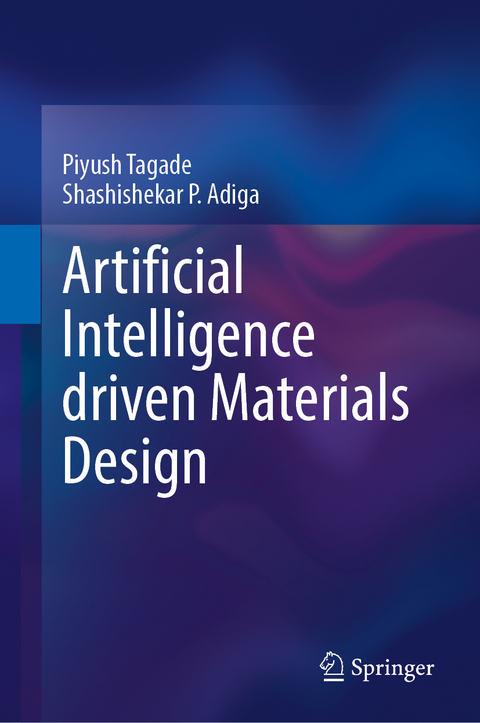
Artificial Intelligence driven Materials Design
Springer Verlag, Singapore
978-981-19-2261-9 (ISBN)
- Noch nicht erschienen - erscheint am 13.06.2025
- Versandkostenfrei innerhalb Deutschlands
- Auch auf Rechnung
- Verfügbarkeit in der Filiale vor Ort prüfen
- Artikel merken
This book presents the application of machine learning and deep learning to Materials Design. Traditional materials design relies on a trial and error based iterative approach towards attaining target material properties often interspersed with accidental discoveries. This approach is very time consuming as both processing/fabrication, characterization of new compositions/structures are quite laborious. The field of machine learning and deep learning can greatly benefit expediting this approach by narrowing down the search space and reducing the number of compounds/structures that are explored in the lab. This book covers the fundamentals of how one goes about applying Artificial Intelligence to materials design followed by specific examples. The book contains 4 sections. In the first section, fundamentals of AI, materials structure representation/digitization and theoretical framework are discussed. In the second section, materials optimization using evolutionary algorithms is discussed. In the third section, application of AI for forward prediction, i.e., given a material structure, how to predict properties, is considered. In the fourth section, we cover inverse prediction or inverse materials design, that is, predicting materials/structures with target properties. The inverse design of materials is an emerging field of materials design and the techniques we present are very novel. We provide examples from both organic and inorganic materials space with diverse fields of applications. The book includes sample codes for these example problems to help readers gain hands-on experience.
Dr. Piyush Tagade obtained his PhD in Aerospace Engineering from Indian Institute of Technology Bombay, India in 2010. He currently works as an AI Technologist at Rolls-Royce Singapore Pte Ltd. Prior to joining Rolls-Royce, he was Research Staff Member at Samsung Advanced Institute of Technology, Samsung R&D Institute, Bangalore, India. Before joining Samsung, he also worked as a postdoctoral researcher at Massachusetts Institute of Technology, USA and Korea Advanced Institute of Science and Technology, Republic of Korea. His research interests include developing AI-driven solutions for engineering problems, application of AI for materials discovery, deep learning, Bayesian inference, uncertainty propagation, data assimilation and optimization. He has co-authored a book on mathematical modeling of Li-ion batteries, has over 40 publications and several patents. Dr. Shashishekar P. Adiga obtained his PhD inMaterials Science and Engineering from North Carolina State University in 2003. He currently heads the Materials and Simulations team at Samsung Advanced Institute of Technology (SAIT), India in Bangalore. Prior to joining SAIT, Dr. Adiga worked at Argonne National Laboratory, Kodak Research Labs, Lockheed Martin Advanced Technology Laboratories and Shell Technology Center. His research interests include computational materials science, materials for energy storage and conversion, automated materials discovery, functional and device materials, application of AI in materials discovery and manufacturing. He has over 38 publications, and several patents.
1. Introduction.- 2. AI algorithms and Computational methods.- 3. Material property optimization using genetic algorithms.- 4. Monte Carlo Tree Search, Reinforcement Learning.- 5. ML for Materials Modeling: Machine Learned DFT and Force Fields.
| Erscheint lt. Verlag | 13.6.2025 |
|---|---|
| Zusatzinfo | 100 Illustrations, color; Approx. 200 p. 100 illus. in color. |
| Verlagsort | Singapore |
| Sprache | englisch |
| Maße | 155 x 235 mm |
| Themenwelt | Informatik ► Theorie / Studium ► Künstliche Intelligenz / Robotik |
| Naturwissenschaften ► Physik / Astronomie ► Allgemeines / Lexika | |
| Naturwissenschaften ► Physik / Astronomie ► Theoretische Physik | |
| Technik ► Maschinenbau | |
| Schlagworte | Deep Learning (DL) • Density Functional Theory (DFT) • Electron Affinity in Organic Molecules • Inverse Materials Design • Inverse Prediction • Machine Learning (ML) • materials characterization • Monte Carlo tree search |
| ISBN-10 | 981-19-2261-6 / 9811922616 |
| ISBN-13 | 978-981-19-2261-9 / 9789811922619 |
| Zustand | Neuware |
| Haben Sie eine Frage zum Produkt? |
aus dem Bereich


